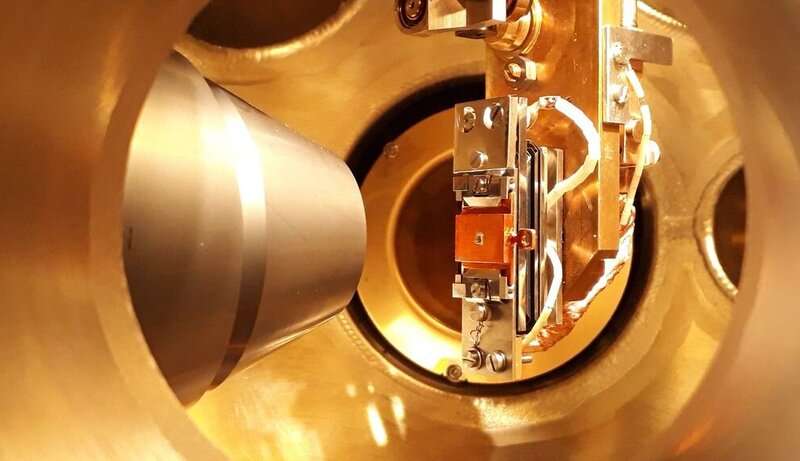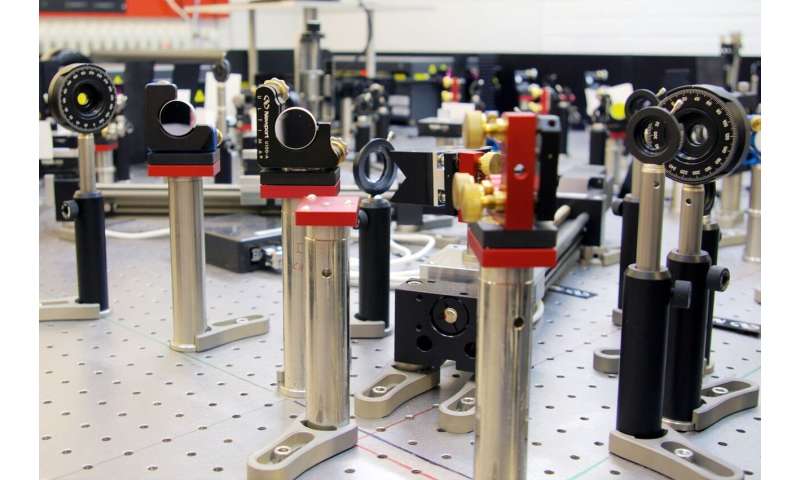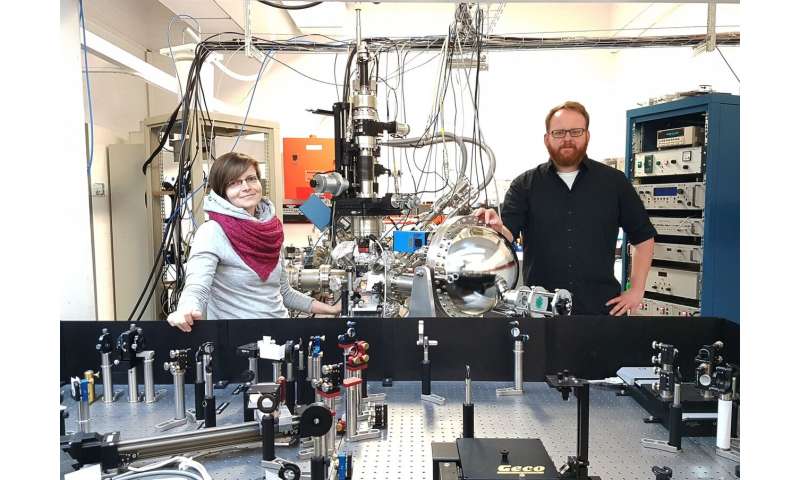
In physics, they are currently the subject of intensive research; in electronics, they could enable completely new functions. So-called topological materials are characterized by special electronic properties, which are also very robust against external perturbations. This material group also includes tungsten ditelluride. In this material, such a topologically protected state can be "broken up" using special laser pulses within a few trillionths of a second ("picoseconds") and thus change its properties. This could be a key requirement for realizing extremely fast, optoelectronic switches.
For the first time, physicists at Kiel University (CAU), in cooperation with researchers at the Max Planck Institute for Chemical Physics of Solids (MPI-CPfS) in Dresden, Tsinghua University in Beijing and Shanghai Tech University, have been able to observe changes to the electronic properties of this material in experiments in real-time. Using laser pulses, they put the atoms in a sample of tungsten ditelluride into a state of controlled excitation, and were able to follow the resulting changes in the electronic properties "live" with high-precision measurements. They published their results recently in the scientific journal Nature Communications.
Weyl semimetals with unusual electronic properties
"If these laser-induced changes can be reversed again, we essentially have a switch that can be activated optically, and which can change between different electronic states," explained Michael Bauer, professor of solid state physics at the CAU. Such a switching process has already been predicted by another study, in which researchers from the U.S. were recently able to directly observe the atomic movements in tungsten ditelluride. In their study, the physicists from the Institute of Experimental and Applied Physics at the CAU now focused on the behavior of the electrons, and how the electronic properties in the same material can be altered using laser pulses.
"Some of the electrons in tungsten ditelluride are highly mobile, so they are excellent information carriers for electronic applications. This is due to the fact that they behave like so-called Weyl fermions," said doctoral researcher Petra Hein to explain the unusual properties of the material, also known as a Weyl semimetal. Weyl fermions are massless particles with special properties and have previously only been observed indirectly as "quasi-particles" in solids like tungsten ditelluride. "For the first time, we were now able to make the changes in the areas of the electronic structure visible, in which these Weyl properties are exhibited."

Excitations of the material changes its electronic properties
To capture the barely-visible changes in the electronic properties a highly-sensitive experimental design, extremely precise measurements and an extensive analysis of the data obtained were required. During the past years the Kiel research team was able to develop such an experiment with the necessary long-term stability. With the generated laser pulses they put the atoms inside a sample of tungsten ditelluride into a state of vibrational excitation. Different overlapping vibrational excitations arose, which in turn changed the electronic properties of the material. "One of these atomic vibrations was known to change the electronic Weyl properties. We wanted to find out exactly what this change looks like," said Hein to describe one of the key goals of the study.
Series of snapshots shows how properties change
In order to observe this specific process, the research team irradiated the material with a second laser pulse after a few picoseconds. This released electrons from the sample, which allowed drawing conclusions about the electronic structure of the material—the method is known as "time-resolved photoelectron spectroscopy". "Due to the short exposure time of only 0.1 picoseconds, we get a snapshot of the electronic state of the material. We can combine many of these individual images into a film and thereby observe how the material reacts to the excitation by the first laser pulse," said Dr. Stephan Jauernik to explain the measurement method.
Recording a single data set on the extremely short modification process typically took one week. The Kiel research team evaluated a large number of such data sets using a newly developed analytical approach and was thus able to visualize the changes in the electronic Weyl properties of tungsten ditelluride.

Extremely short switching processes conceivable
"Our results demonstrate the sensitive and highly-selective interplay between the vibrations of the atoms of the solid and the unusual electronic properties of tungsten ditelluride," summarized Bauer. Follow-up research aims at investigating whether such electronic switching processes can be triggered even faster—directly by the irradiating laser pulse—as has already been theoretically predicted for other topological materials.
Explore further
Citation: Physics team observes extremely fast electronic changes in real time in a special material class (2020, July 7) retrieved 7 July 2020 from https://ift.tt/2ZMi7OJ
This document is subject to copyright. Apart from any fair dealing for the purpose of private study or research, no part may be reproduced without the written permission. The content is provided for information purposes only.
"Electronic" - Google News
July 07, 2020 at 09:45PM
https://ift.tt/2ZMi7OJ
Physics team observes extremely fast electronic changes in real time in a special material class - Phys.org
"Electronic" - Google News
https://ift.tt/3dmroCo
https://ift.tt/3bbj3jq
No comments:
Post a Comment